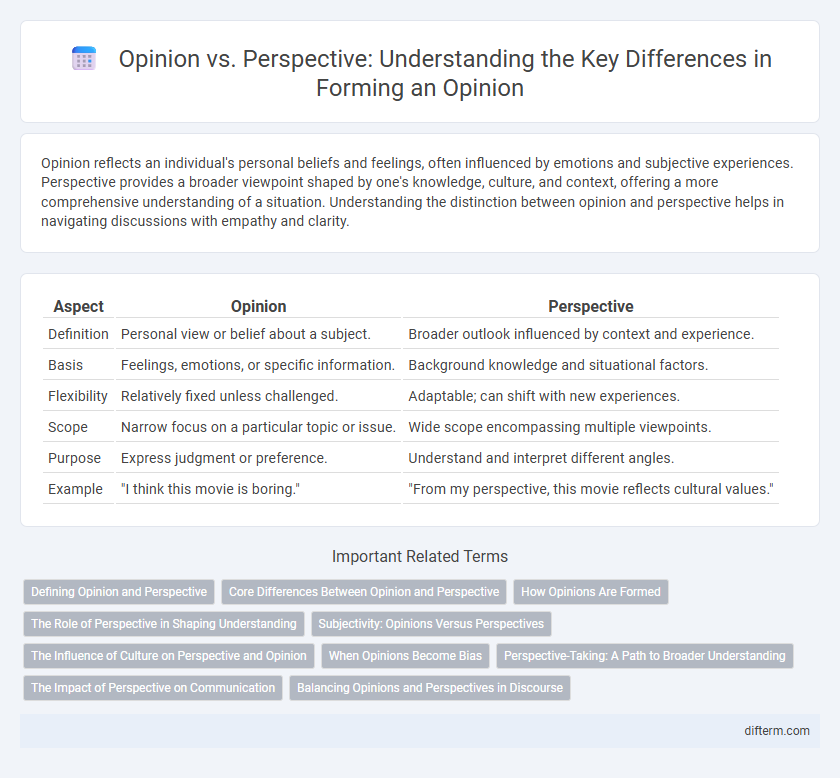Opinion reflects an individual's personal beliefs and feelings, often influenced by emotions and subjective experiences. Perspective provides a broader viewpoint shaped by one's knowledge, culture, and context, offering a more comprehensive understanding of a situation. Understanding the distinction between opinion and perspective helps in navigating discussions with empathy and clarity.
Table of Comparison
| Aspect | Opinion | Perspective |
|---|---|---|
| Definition | Personal view or belief about a subject. | Broader outlook influenced by context and experience. |
| Basis | Feelings, emotions, or specific information. | Background knowledge and situational factors. |
| Flexibility | Relatively fixed unless challenged. | Adaptable; can shift with new experiences. |
| Scope | Narrow focus on a particular topic or issue. | Wide scope encompassing multiple viewpoints. |
| Purpose | Express judgment or preference. | Understand and interpret different angles. |
| Example | "I think this movie is boring." | "From my perspective, this movie reflects cultural values." |
Defining Opinion and Perspective
An opinion is a personal judgment or belief that reflects an individual's thoughts and feelings about a subject, often influenced by emotions and experiences. Perspective represents a broader viewpoint shaped by cultural background, knowledge, and context, providing a lens through which information is interpreted. Understanding the distinction between opinion and perspective is crucial for clear communication and critical thinking.
Core Differences Between Opinion and Perspective
Opinion reflects a personal belief or judgment formed without requiring complete evidence, often influenced by emotions and individual experiences. Perspective represents a broader viewpoint shaped by cultural, social, or situational factors that provide context and understanding beyond personal bias. The core difference lies in opinion's subjective nature versus perspective's capacity to encompass multiple angles and deeper insight.
How Opinions Are Formed
Opinions are formed through the interpretation of personal experiences, cultural background, and available information, shaping an individual's belief system. Unlike perspectives that reflect a broader viewpoint influenced by external factors, opinions are often subjective and emotionally driven. Cognitive biases and social influences significantly impact how opinions develop, reinforcing certain judgments over time.
The Role of Perspective in Shaping Understanding
Perspective plays a crucial role in shaping understanding by providing a unique lens through which information is interpreted, distinguishing it from mere opinion that often reflects personal bias without deeper context. It enables individuals to consider multiple viewpoints, enhancing critical thinking and fostering empathy in discourse. The dynamic interplay between perspective and opinion ultimately shapes more nuanced, comprehensive interpretations of complex issues.
Subjectivity: Opinions Versus Perspectives
Opinions reflect subjective judgments shaped by personal beliefs and emotions, often expressing individual preferences or biases. Perspectives offer broader viewpoints that consider various factors, enabling a more comprehensive understanding beyond mere subjectivity. Understanding the distinction highlights how opinions convey personal stances while perspectives embrace contextual awareness.
The Influence of Culture on Perspective and Opinion
Culture profoundly shapes both opinion and perspective by providing the foundational values, beliefs, and experiences that inform individual viewpoints. While opinion often reflects personal judgments on specific issues, perspective encompasses the broader cultural framework that influences how those opinions are formed and interpreted. Recognizing the role of cultural context allows for a deeper understanding of why individuals from different backgrounds may hold divergent yet valid viewpoints.
When Opinions Become Bias
Opinions become bias when subjective beliefs are presented as absolute truths, limiting openness to alternative viewpoints. This cognitive rigidity distorts perception and hinders critical thinking, often reinforcing stereotypes and misinformation. Recognizing the transition from opinion to bias is essential for fostering balanced understanding and constructive dialogue.
Perspective-Taking: A Path to Broader Understanding
Perspective-taking involves actively considering others' viewpoints, enhancing empathy and reducing biases. This approach fosters broader understanding by encouraging open-mindedness and challenging personal assumptions. Developing perspective-taking skills leads to more effective communication and deeper social connections.
The Impact of Perspective on Communication
Perspective shapes communication by influencing how messages are interpreted and conveyed, often leading to varied understandings even with the same information. Opinions are expressions of individual beliefs or judgments, whereas perspective encompasses broader contexts, experiences, and viewpoints that frame those opinions. Recognizing the impact of perspective enhances empathy and clarity in dialogue, reducing miscommunication and fostering more meaningful exchanges.
Balancing Opinions and Perspectives in Discourse
Balancing opinions and perspectives in discourse requires recognizing that opinions reflect individual beliefs shaped by emotions, while perspectives encompass broader contexts influenced by experiences and knowledge. Effective discourse thrives when diverse viewpoints are acknowledged and integrated, fostering mutual understanding and critical thinking. Emphasizing the distinction between subjective opinions and informed perspectives enhances communication and reduces conflicts in decision-making processes.
opinion vs perspective Infographic

 difterm.com
difterm.com